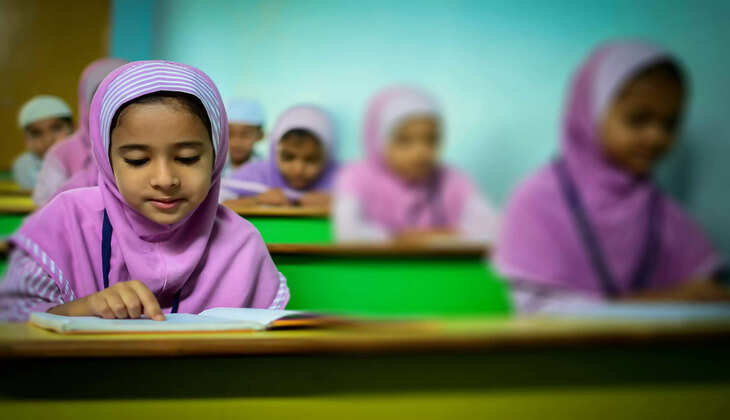What is New Education Policy Of India?
Updated: May 30, 2024, 15:56 IST

The New Education Policy (NEP) of India, introduced in 2020, is a comprehensive framework designed to overhaul the Indian education system. The policy aims to make the education system more holistic, flexible, multidisciplinary, and aligned with the needs of the 21st century. Here are the key highlights and changes introduced by the NEP 2020:
1. Early Childhood Care and Education (ECCE)
- Foundational Stage: Introduction of a new curricular structure of 5+3+3+4, replacing the previous 10+2 system.
- Age Group: The foundational stage covers children aged 3 to 8 years, including three years of preschool and two years of primary school.
- Focus: Emphasis on play-based and activity-based learning.
2. School Education
- Preparatory Stage: For children aged 8 to 11 years (Grades 3-5), focusing on discovery-oriented and experiential learning.
- Middle Stage: For children aged 11 to 14 years (Grades 6-8), introducing subjects like science, mathematics, arts, social sciences with a multidisciplinary approach.
- Secondary Stage: For students aged 14 to 18 years (Grades 9-12), offering greater flexibility with a choice of subjects and disciplines, integrating vocational education, and emphasizing critical thinking and life skills.
3. Curricular and Pedagogical Reforms
- Reduced Curriculum: The curriculum will be reduced to core essentials to allow more focus on critical thinking, inquiry-based, discovery-based, discussion-based, and analysis-based learning.
- Multilingualism: Promotion of mother tongue/local language/regional language as the medium of instruction at least until Grade 5, and preferably till Grade 8 and beyond.
- Assessment Reforms: Shift from rote learning to competency-based learning. Exams will assess students' higher-order skills, such as analysis, critical thinking, and conceptual clarity.
4. Higher Education
- Multidisciplinary Approach: Establishment of large multidisciplinary universities and colleges. Flexibility in subject choices and a holistic and integrated approach to education.
- Undergraduate Programs: Introduction of a flexible undergraduate degree with multiple exit options, such as a certificate after one year, a diploma after two years, and a Bachelor’s degree after three or four years.
- Academic Bank of Credit (ABC): A digital repository of credits earned by students that can be transferred and counted towards the final degree.
- Research and Innovation: Establishment of the National Research Foundation to foster a strong research culture and build research capacity across higher education.
5. Teacher Education
- Integrated Teacher Education Program: By 2030, the minimum degree qualification for teaching will be a 4-year integrated B.Ed. degree.
- Continuous Professional Development: Regular opportunities for teacher professional development and incentives for outstanding teachers.
6. Vocational Education
- Integration into Mainstream Education: Vocational education will be integrated into the school and higher education system in a phased manner, starting from Grade 6 with internships.
- Target: At least 50% of learners shall have exposure to vocational education by 2025.
7. Technology in Education
- National Educational Technology Forum (NETF): Establishment of NETF to provide a platform for free exchange of ideas on the use of technology to enhance learning, assessment, planning, administration, and so on.
- Digital Infrastructure: Emphasis on digital literacy, digital infrastructure, and development of e-content and online learning platforms.
8. Governance and Regulation
- Higher Education Commission of India (HECI): Creation of HECI as a single overarching umbrella body for the entire higher education, excluding medical and legal education.
- Functions: Regulation, accreditation, funding, and academic standards.
- School Complexes: Establishment of school complexes or clusters to ensure adequate resources and effective governance.
9. Equity and Inclusion
- Access to Education: Special emphasis on socially and economically disadvantaged groups (SEDGs) including gender, socio-cultural, and geographical identities.
- Inclusive Education: Ensuring that children with disabilities are able to fully participate in the regular schooling process from foundational stage to higher education.
10. Lifelong Learning
- Adult Education: Focus on providing opportunities for lifelong learning through community participation and use of ICT.
Implementation
- Phased Implementation: The policy will be implemented in phases, starting from the current academic year, with the goal of full implementation by 2040.
- Collaboration: Collaboration between the central and state governments, along with a robust public consultation process, will be key to the successful implementation of the NEP.
The NEP 2020 represents a significant shift in the Indian education system, aiming to make it more inclusive, flexible, and geared towards producing well-rounded individuals equipped for the challenges of the modern world.
